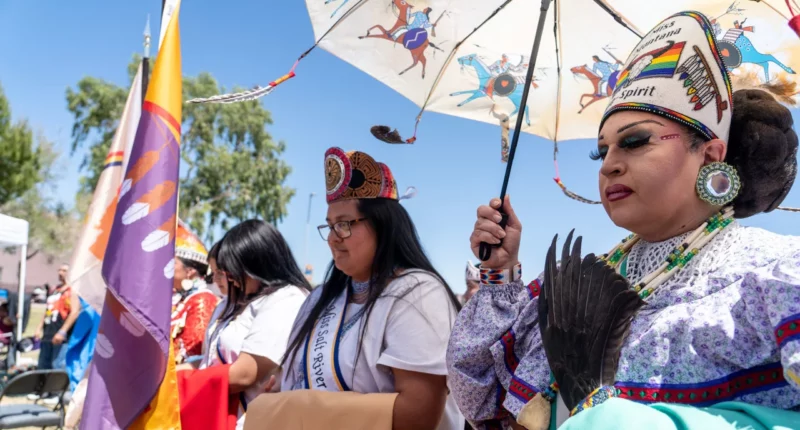In the ongoing battle to honor their cultural heritage, members of Montana’s Two-Spirit community are actively challenging a state law that rigidly defines sex within a binary framework, citing a violation of their spiritual and cultural principles.
Senate Bill 458, the contentious law in question, bases its definition of “male” and “female” on the presence of XY or XX chromosomes and reproductive systems. Implemented in October, this legislation embeds these binary definitions into various segments of the state’s legal code, impacting vital documents such as driver’s licenses, demographic records, and the state’s anti-discrimination legislation.
Legal action ensued in October when lawyers representing the Montana Two Spirit Society, a nonprofit advocating for Two-Spirit individuals, together with transgender, intersex, and nonbinary residents of Montana, filed a lawsuit in the Missoula County District Court challenging the law’s legitimacy.
Their argument revolves around the contention that the state’s rigid classification of sex “incorrectly labels numerous Montanans, completely excludes others from legal recognition, and deprives them of the protections afforded by numerous state laws.” Furthermore, the complaint asserts that the law breaches Montana’s laws on individual dignity, equal protection, privacy, and freedom of expression.
David Herrera, the co-founder and executive director of the Montana Two Spirit Society, stressed the importance of their involvement in the lawsuit, emphasizing that confining gender within a binary construct contradicts Indigenous traditions and cultures.
“We don’t confine ourselves to mere biological definitions. We recognize the presence of various genders, which our cultures have acknowledged for a long time. In several Indigenous cultures, there could be as many as four to six different genders,” stated Herrera, a 61-year-old individual who identifies as Two-Spirit and has been adopted into the Blackfeet tribe.
The lawsuit lists Montana’s Republican Governor Greg Gianforte and Montana’s Attorney General Austin Knudsen as defendants. When approached for comment, a spokesperson for the governor informed CNN that the governor’s office “typically refrains from commenting on ongoing litigations.” Emilee Cantrell, a representative for the Montana Department of Justice, mentioned that the state is expected to respond to the lawsuit by December 14.

The term “Two-Spirit” emerged in the 1990s, encompassing individuals in numerous Indigenous and Native American communities who historically embodied both masculine and feminine spirits, holding unique social and spiritual roles. Some Native American individuals identifying as lesbian, gay, bisexual, transgender, intersex, or gender non-conforming also adopt this term for self-identification purposes.
Before colonization, Two-Spirit people occupied esteemed roles in healing and ceremonial practices. However, as Indigenous communities were coerced into assimilation, this integral aspect of their heritage was lost.
“For those identified as Two-Spirit, men dressing as women or women as warriors contradicted church teachings, branding them as abominations or deviants. In some historical accounts, our Two-Spirit individuals were murdered, while in others, they were coerced into conforming to specific gender norms,” explained Herrera.
Steven Barrios, a 71-year-old member of the Blackfeet Nation and co-founder of the Montana Two Spirit Society, voiced the organization’s solidarity with efforts to oppose the state’s new gender definitions.

“We’ve been through so much trauma due to government actions, and we’ve decided it’s time to reclaim what’s rightfully ours and prevent the government from taking that away,” said Barrios.
Barrios also expressed concerns that SB 458 and similar legislation could exacerbate challenges faced by Two-Spirit youth.
“It’s frightening; in our reservations, there’s already a high suicide rate because they struggle to be themselves,” Barrios remarked.
A study conducted in 2021 by the Williams Institute at the UCLA School of Law estimated that around 6% or 285,000 American Indian and Alaska Native-only adults in the United States identify as LGBTQ. Despite changes since colonization, LGBTQ Indigenous people and Two-Spirit individuals still encounter violence, contributing to their heightened mental health issues.
Researchers discovered that 43% of Indigenous LGBTQ adults have been diagnosed with depression, surpassing the rate among their non-LGBTQ counterparts, who are at less than 25%. Most Indigenous LGBTQ adults reported facing daily discrimination and verbal abuse in the past year. Shockingly, 57% mentioned experiencing physical or sexual assault as adults, according to the study.
Rylee Sommers-Flanagan, an attorney representing the plaintiffs, emphasized the necessity of encompassing various Montanans’ experiences, especially those from the Two-Spirit community.
“This community has existed for a significant period. The impact of these laws on individuals is real, tangible, and profoundly felt,” Sommers-Flanagan concluded.





